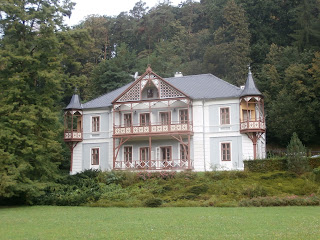While popping by Fesitwal Słowa im. Jerzego Pilcha in Wisła we visited one of several temporary bookshops' stalls to come by a book for our friends' three-year-old son. As the purchase was finalised, a cordial seller handed us another book, Taśmy Rodzinne, by Marcin Marcisz. The book's cover is quite conspicuous, as it resembles a cover of an E-180 VHS tape. In June I indulged in reading books borrowed from a local library, while the gift book, which appeared anything, but precious (why would somebody want to give it away?), waited its turn on my bedside table.
Watch out! Several spoliers in the content below.
The novel is bloody fucking sad and slightly chaotic, as the family story is told from the perspective of a 31-year-old son, but at times also seen with his father's eyes. A reader drifts between the present and the past, as numerous retrospections bring back the bleak family history.
Characters of the book used to be beneficiaries of the transition into a free-market economy in early 1990s. Father of the family was one of those who had both courage and luck to seize opportunities given by the nascent capitalism. The price to pay was working nearly 20 hours a day, yet trading in Western goods fetched large margins which helped him grow rich quickly. His family soon became the new elite, or actually the (despicable?) nouveau-rich of that era.
As retrospects depict the daily life of the family in late 1990s and early 2000s, earning and spending money looms as a main purpose of their life. Stuff bought for money seem to fill the emptiness of their life. The characters become typical thoughtless customers who buy things they do not need to impress people they dislike. Consumption becomes a goal itself, instead of facilitating reaching true goals.
Like in every family, if you scratch beneath the surface, you will find some dirty linen the author deftly washes. Here the father, being only breadwinner (his wife and mother of three children only looks after the offspring and is aided by a couple of housekeepers) not only dislikes his family. If they infuriate him, he loses his temper and beats sons to a pulp. The family has to balance dependence on and fear of the man who makes money to keep their standard of living.
The wholesale trading business which fetched extraordinary profits in the 1990s and 2000s grew large. Its scale required more prudent management. Besides, competition from large wholesale chains and discounter retailers began to hammer nails to its coffin. Now imagine the family, accustomed to high standard of living, suffers a shock when the money, hitherto in abundance, runs out.
Family father, the breadwinner, considers two options: either a suicide, resembling a heart attack behind the wheel and subsequent collission with a tree, or a lonely escape to a distant country and starting out from scratch.
His wife plunges into depression when she cannnot afford to buy all material joys of her life.
The children discover money does not grow on trees, but also are forced to learn the art of saving and resisting temptation to indulge in consumption.
The lifestyle inflation is the prevalent phenomenon I observe all around. I realise why it is so tempting, but I have never fully comprehended it. Lavish spending has never taken my fancy, it has never killed my sadness, it will not fill emptiness in my life. For many people it makes up for deficiencies, it is a goal itself, rather than a tool which helps reach goals.
In my professional life I met several businessmen, owners of companies with nine- or ten-digit annual revenues. Three record-high costs of making ends meet for such businessmen and their families were between 2 and 5 million Polish zlotys per month. But my sample was confined to cases where a company was in trouble and banks called for financial contribution from its owner, hence their net worth was analysed. My jaw drops open, as I would lack ideas what to spend such money on. In turn my workmates' jaws drop open when I say if I had some spare 10 million zlotys, I would not buy a more expensive car than the one I currently have.
Just now I realised I have not shared the outcome of keeping a very detailed record of my income and spending in the entire 2023. I had resolved to do the exercise upon realising I have no idea what my cost of living are. I will not disclose my earnings and other non-financial income, nor how much I managed to put aside last year, but my spending will be revealed. I broke down my expenses in a matrix into recurring or one-off and into obligatory (those absolutely necessary) or discretionary. The former consisted of dwelling upkeep and bills, nutrution, health-related, household chemicals and car maintenance (though it could have been given up). The latter included socialising, travels, culture and all other pleasures and whims not essential to get by. My average monthly spending was PLN 5,522, of which obligatory monthly expenses averaged out PLN 2,969. It seems a single male with no dependants, no mortgage, living in his own flat a driving his depreciated, yet reliable car could eke out a living in the capital of Poland for less than PLN 3,000 per month.
The old Polish adage od przybytku głowa nie boli (literally: affluence does not cause a headache) does not actually hold true, which is superbly explained in Michael's post.
Off to Wisła for the next two weekends and the working week in between, so next post due in early August.


















